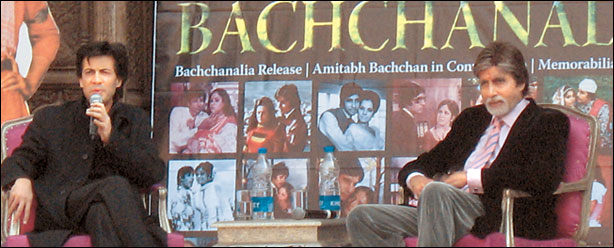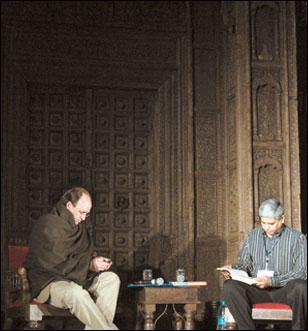|
|
| |
must
read
Introducing the muse behind Slumdog Millionaire:
Vikas Swarup's Q and A
As Slumdog Millionaire fever grips worldwide, and it picks
up award after award and its share of Bollywood detractors,
Instep takes a look at the book that formed the basis of the screenplay
for the much-raved about film.
By
Huma Imtiaz
|
| |
 |
| |
I
have a confession to make. I claim to be quite well read, for someone
my age. I also claim that I read the original books before I see their
cinematic adaptations. But I swear that I did not know the Oscar-favourite
Slumdog Millionaire was based on a book. Because this fact has been
relegated to the backburner given the tremendous amount of success
and publicity Slumdog Millionaire is garnered, the book appears to
be forgotten.
And it is perhaps this bitterness that you glimpse in author Vikas
Swarup's demeanour, the man who wrote Q and A, the muse for Slumdog's
screenplay. After all, he claims he wasn't invited to any of the award
shows where Slumdog Millionaire's makers and cast have picked up a
slew of awards, and flew to London on his own expense to see the movie
after he kept getting calls from inquisitive reporters on what he
thought of his book's filmi version.
Q and A is nothing like its award winning cinematic version, Slumdog
Millionaire. Its author too, is nothing like the main protagonist
of the movie - he's from the Foreign Services, a charming, glib diplomat.
Hearing him talk, one would think his answers were rehearsed, but
then one realizes that a diplomat does not become a diplomat unless
blessed with the gift of gab. And despite the controversy and criticism
the movie has garnered within India, hundreds of people gathered in
the lawns of the Diggi Palace in Jaipur on a wintry January evening,
at the recently-concluded prestigious DSC Jaipur Literature Festival
2009 to hear him speak.
Even
though the reading was crowded, with the young and old swarming to
hear what Vikas Swarup had to say, especially after Amitabh Bachchan
blogged vehemently against the film, Swarup was quick to respond to
my question during the session regarding his research as a writer
that went into writing about the slums, a question I feel is important
to ask - after all, when is the last time one heard of a diplomat
visiting the slums? "Yes, a lot of research did go into the book.
But fundamentally, we're all the same people. You have to put yourself
into the character's shoes. Beyond research, there has to be empathy."
And this is perhaps why Ram Mohammad Thomas, the character in Q and
A (aka Jamal Malik of Slumdog Millionaire) strikes such a chord within
us. We all see poverty around us everywhere, whether we're in India
or Pakistan. And this is perhaps why people within India did not like
the movie, and there is a derisive tone in the voices of many when
you ask them what they thought of the film. After all, one doesn't
go to the cinema to see a parallel of one's world, particularly in
South Asia. A three-hour film in a cinema is a means to escape from
the harsh realities of the world around us.
|
| |
The
book and movie are similar in several ways: Yes, both the characters
hail from the slums. Both go to Agra, both have interesting
lives, filled with colour and characters that leave you amazed
and saddened. Both go to a game show, wanting to win a certain
amount of money and both are arrested after they answer a certain
number of questions correctly. There is a girl involved in both
characters' lives, but that is where the similarity ends. Q
and A has a different set of questions and a very different
account of events of the life of the main protagonist. Slumdog
Millionaire on the other hand, is based loosely on the main
themes of the book - the slums, the magic of winning millions
of rupees, and the adventures a street boy in India goes through
and how he rises in life. It is these poignant and instantly
relatable themes that have made Slumdog Millionaire such a success.
And it is interesting to see a film adaptation that does not
attempt to copy the book to the letter, since those usually
go awry.
|
 |
|
| |
|
Reading Q and A is an interesting experience, since
one inevitably draws parallels between the book and the film. But
the book paints a picture of the main protagonist sans Technicolour
dreams, touching on religion and secularism, friendship and empathy,
and a wide-eyed look at the world around Ram Mohammad Thomas. Written
in that same matter-of-fact manner that is characteristic of South
Asian authors, Q and A definitely deserves to be read for a deeper
look at the themes that have won Slumdog so many fans (and awards!)
-- Photographs by the author
Acclaim for Q and A
Q and A won South Africa's Boeke Prize in 2006. It was also shortlisted
for the Best First Book by the Commonwealth Writers' Prize and won
the Prix Grand Public at the 2007 Paris Book Fair.
"A colourful portrait of Indian society is
painted with remarkable lightness and wit." - Sunday Telegraph
"(A) rare, seemingly effortless brew of humour,
drama, romance and social realism...Swarup...has achieved a triumph
with this thrilling, endearing work which gets into the heart and
soul of modern India." - The New Zealand Herald
"Q
& A is that rare novel that chugs along on the parallel tracks
of being a rollicking read as well as being a polished, varnished,
finished work of impressive craftsmanship." – Hindustan
Times
|
| |
| |
| |
| |
| |
| |
| |
|

